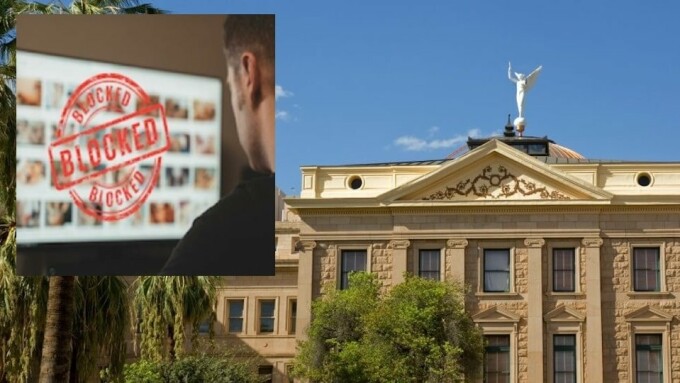PHOENIX — The Arizona state legislature on Monday passed the state’s version of the age verification bills being sponsored around the country by anti-porn religious conservative activists, despite vocal opposition from Democratic legislators.
HB 2596 has been sent to Democratic Gov. Katie Hobbs, who has five days to either sign it into law or veto it. If Hobbs does neither within that time frame, HB 2596 will become law automatically.
Free Speech Coalition is urging Arizonans to “tell the Governor that she should veto this dangerous and ineffective bill,” and has set up a page where they can voice their opposition by sending an email to Hobbs.
On Monday, Free Speech Coalition Executive Director Alison Boden wrote to Hobbs, outlining the free speech and privacy concerns raised by HB 2596 and copycat bills being passed around the country.
The text of the FSC letter follows:
The Free Speech Coalition, an advocate for the rights of the adult industry and others engaged in constitutionally-protected sexual expression, writes to express our deep concern regarding HB2586, and ask that you veto the legislation.
The adult industry whole-heartedly supports efforts to keep young people from material that is age-inappropriate or harmful. Unfortunately, HB2586 has significant practical, technical and legal problems that render its ability to protect children limited, while creating dangerous privacy risks for adults, and violating the First Amendment rights of both consumers and producers.
Age-Verification Bills Have a Substantial Chilling Effect
In the past fourteen months, several similar age-verification bills have gone into effect in other states. In that time, we’ve seen a substantial chilling effect on adult consumers seeking to access legal content. Some adult websites initially attempted to comply with the laws, only to find that the vast majority of adult consumers — as many as 97% — refuse to submit their ID or otherwise engage age-verification protocols.
Despite the claims of the proponents of HB2586, submitting an ID online for sensitive content is simply not the same as flashing an ID at a checkout counter.
The process is expensive and complicated, and most consumers fear the real risks of surveillance, identity theft and exposure.
Proponents of these laws have promised that this information will never be shared, but anyone who knows the history of the internet and hacking, knows how unrealistic that is.
Even more worrisome, these bills allow this sensitive information to be stored and sold. While age-verification providers themselves are barred from retaining this information, state governments, credit bureaus, employers, banks or other databases against which age and identity is checked are not.
Unfortunately, this chilling effect goes far beyond explicit adult content. The law is written so broadly that the “description” or “depiction” of nudity, sexuality or sexual activity can create liability for a website, if it is determined to be inappropriate for a single minor. In the past several years, we’ve seen that the designation “material harmful to minors” has been weaponized to censor art, sex education, LGBTQ+ literature and healthcare resources, chilling speech throughout the public square. With HB2586, the same tactics could now be applied to the internet.
Age-Verification Bills Have Been Rejected by the Supreme Court
The issue of how best to protect minors online is not new, and from the beginning of the internet the Supreme Court has understood that we needed to balance the protection of minors with adults' constitutional right to access controversial, but legal speech and ideas. The Court and others like it have repeatedly ruled and reaffirmed that, unlike showing your ID at a gas station, age-verification does not pass the strict scrutiny required by the First Amendment. The risk of surveillance or exposure dissuades adults from their willingness to access legal speech. Last August, in a decision granting a preliminary injunction against a similar law in Texas, United States District Judge David Ezra was clear about the risks to consumers:
“Privacy is an especially important concern… because the government is not required to delete data regarding access, and one of the two permissible mechanisms of age-verification is through government ID. People will be particularly concerned about accessing controversial speech when the state government can log and track that access.
“By verifying information through government identification, the law will allow the government to peer into the most intimate and personal aspects of people’s lives. It runs the risk that the state can monitor when an adult views sexually explicit materials and what kind of websites they visit. In effect, the law risks forcing individuals to divulge specific details of their sexuality to the state government to gain access to certain speech. Such restrictions have a substantial chilling effect.”
This is consistent with decades of legal precedent. In Reno v. ACLU, the Supreme Court found that the burdens posed by online age verification unnecessarily suppress access to protected speech, and that “less restrictive alternatives” — such as parental filters — ”would be at least as effective” at barring minors from seeing adult material.
Such filters are regularly used by schools and workplaces, and adult businesses already voluntarily register our sites with them to make sure adult sites are effectively blocked.
We understand the impetus and the urgency of preventing minors from accessing adult content, and are eager to work with legislators on a bill that would be more effective but not trigger the privacy concerns, compliance risks and constitutional triggers associated with this bill. We are eager to work with you to find a solution and look forward to discussing the issue further, but join us and our colleagues at other civil rights organizations in asking you to veto HB 2586.
FSC testified at multiple hearings during the bill’s passage and "has worked aggressively to stop the legislation," a rep noted.
“We’ve left nothing on the field in Arizona,” Boden added. “While the Republican legislature was largely unwilling to engage in substantive discussion over the bill’s flaws, we’re hopeful that with a unified Democratic opposition and a Democratic governor, we can secure a veto.”








